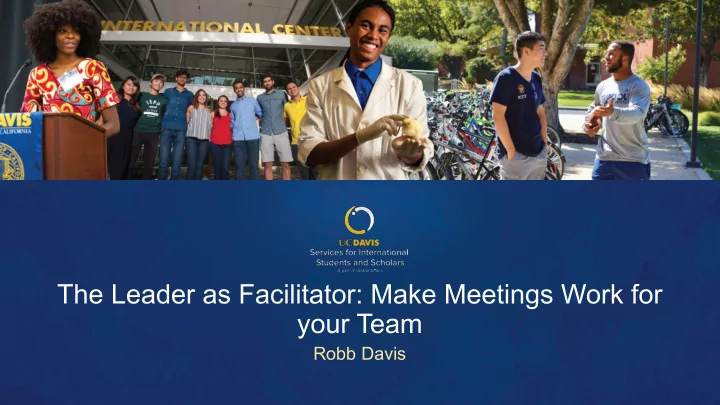

The Leader as Facilitator: Make Meetings Work for your Team Robb Davis
Session Purpose Leaders, by definition, lead teams of people to accomplish organizational outcomes. Leaders understand both their own skills and gifts and identify and draw on those of their team. Team interactions are opportunities to allow members' individual gifts and skills to chart the direction of the organization. But meetings are often poorly planned, lacking in clear objectives, and structured in ways that do not build relevance for team members or value their input. This workshop provides an intuitive design approach to assure that clear meeting objectives are set and that the leader has basic tools to maximize team member input in the limited time meetings often require.
Session objectives By the end of the workshop, participants (you!) will have… • Identified the factors that make for effective team meetings (learning events) and compare them to theory on how learning occurs. • Used a "seven-element" design process to consider critical meeting issues and plan for accountable meeting outcomes.
Task • Turn to someone next to you and (quickly) list out different kinds of meetings (think of organizations you are part of or know about) • Try to determine different kinds by naming the unique purpose of each. • We will hear your responses and capture them.
Task • In pairs, describe a really good learning experience you have had as an adult. • Then, analyze it. • Name one to two factors that made it so good and write them on post-it notes, one per card. We’ll review all your factors and then compare them with research on adult learning.
Task • Compare our group’s responses to this list. What questions and insights arise as you consider these factors in light of your current situation? • Around your table, choose one of these key factors and use this question below to examine it carefully: • How do you or your colleagues build any of these factors into the teaching/training you do or meetings you prepare and lead? Be as specific as possible in your examples. • We will hear from whoever wants to share.
Task • Review the cards that describe the Seven Elements of Design. Each poses a question for you to answer when designing a learning event or meeting. • Use the 2 questions below with your table group as a guide to further examining the usefulness of the Seven Steps of Design in your own situations. • Which of these questions are ones that you currently consider? • Which ones are not usually discussed or considered?
Task • In small groups, rotate around to the various meeting design scenarios on the walls. Discuss the questions/reflection points by drawing on the suggested 7 Elements of design. • We will come back together and hear your comments on how using parts of the 7 Elements worked in analyzing the designs.
Accountability Accountability is a critical principle. The design of tasks, the sequence, and reinforcement of content in meetings and learning events must be accountable to participants. Participants must be aware of what they are to accomplish and learn, what they are learning and ultimately be able to do what they have learned and act on what they have decided to do. An accountable design sets forth achievement based learning objectives that are quantifiable and verifiable. - The leaders/facilitator/teacher is accountable to the learners for the design and for fulfilling a their responsibilities: adequate preparation, learning needs assessment, showing respect for all learners, timing tasks appropriately, evaluating the learning and for being responsive to each and all.
Robb Davis rwdavis@ucdavis.edu 530 564 9861
Recommend
More recommend